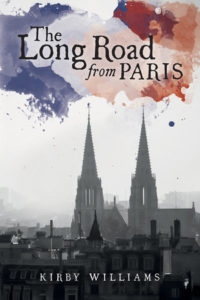5 Books You May Have Missed in December
From a Metafictional Murder Mystery to Tales of Amputation
You might be ready to clean out various cupboards and closets for a new year, but not so fast with that bookshelf: There are some titles from 2018 you should keep a little longer, or even put on your TBR pile for 2019. Some books published in December you might have missed include a debut novel from a respected writer/former blueberry farmer, a World War II-era thriller with an African-American protagonist, and a bracingly cheeky book about Slovak life.

Chloé Delaume, Not A Clue (trans. Dawn Cornelio)
(University of Nebraska Press)
Chloé Delaume’s novel Not A Clue plots a “life-size game of Clue” as six psychiatric patients in a Parisian hospital become suspects in a doctor’s murder. Like many modern detective stories, this one includes lots of backstory on the characters as an omniscient narratrix leads the chase. But Delaume’s purpose lies beyond character, plot, and even game pieces. She’s interested in Alfred Jarry’s concept of the “clinamen” or swerve—and in how we are all actually fictional creations of our own making. (It may help to know, as translator Dawn Cornelio explains in her introduction, that Delaume was born Nathalie Dalain, and for many years proclaimed that “My name is Chloé Delaume. I am a fictional character.”) So yes. Very very French, very very high concept, and very very fun to read. Who cares if you don’t clue in to all of the author’s layers of meaning about the literary world that are crammed into the mysterious doings? Peut-être la prôchaine fois.

Kirby Williams, The Long Road from Paris
(Pushcart Press)
Although it also takes place in France, The Long Road from Paris by Kirby Williams might as well take place on a different planet. I rarely choose series novels for this column, but the second volume about Urby Brown (the first was 2014’s Rage in Paris), a black American and his Jewish lover Hannah Feingold, is worth reading just to see characters who aren’t privileged WASPs coping with the specter of another world war. Author Williams moved to Paris in the early 1960s to escape racism at home, and his experience in the UNESCO Secretariat from 1967 to 2000 helps him show the good and bad ways bureaucracy works during conflict. The Long Road from Paris isn’t just about a mystery—it’s about whether or not Urby and Hannah will make it out of France alive before that country falls to the Germans. If you love the work of Alan Furst, Dan Fesperman, and Kristin Hannah, give this one a try.

Ayo Tamakloe-Garr, The Wolf at Number Four
(Ohio University Press)
Speaking of series: Ayo Tamakloe-Garr’s The Wolf at Number Four is part of the Modern African Writing Series, a debut novel that, like many of the best debuts, manages to be simultaneously surprising and familiar. A disgraced young schoolteacher befriends her new neighbor, an 11-year-old boy prodigy, and they seem to help each other. But in 1990s Cape Coast, Ghana, the past threatens every bit of the present, and wolves wait close by every door. That’s right, wolves—Tamakloe-Garr, who says he was inspired by A Streetcar Named Desire and Mary Shelley’s Frankenstein, has written a modern gothic fable about what happens when evil is hungry and feeds off goodness. Like another debut novel set in Nigeria, 2018’s Welcome to Lagos by Chibundu Onuzo (Catapult), this one manages to present dark material sincerely but also with a great deal of humor. Don’t miss it.

Jana Beňova, Away! Away! (trans. Janet Livingstone)
(Two Dollar Radio)
Set thousands of miles to the north, Jana Beňová’s Away! Away! provides laughs of a slightly more satirical, world-weary sort. Rosa has run away from home and her husband and taken up with a puppeteer who is determined to bring his production of The Snow Queen far and wide. “The foundation of a creative life is skipping out,” the narrator tells us. “Adventure.” That narrator speaks not in stream of consciousness, but in a sort of manic, ADD awareness, skipping from thought to thought and idea to idea so that readers have to stay alert as late-night drivers to follow along and understand. No surprise—it’s the journey, not the arrival, that matters, and Rosa’s journey is filled with slings and arrows of outrageous Slovakian fortune, the kind that result from decades of war, occupation, and deprivation. Characters keep their Sony Walkmans together with tape and rubber bands, patiently bear infrastructure inconveniences like bridge closures, and consider two kinds of table salt true luxury.

Jess Hagemann, Headcheese
(Cinestate)
Headcheese by Jess Hagemann is a collection of stories centered on amputation and amputees. However, it’s less about fetishism and more about the human condition whence all fetishes spring. A single lost toe might have more of an effect on a character’s perspective than an entire missing limb. Hagemann, who lives in Austin, Texas, operates a ghostwriting business called Cider Spoon Stories. Her expertise in other people’s stories carries over to her own fiction, with its imaginative takes on a man who must truly excise his wife’s ghost, an engineer tasked with rebuilding his child’s body, and many more (there are 26 stories total, although the volume is called a novel; they are linked through an epistolary device and a character known as “Captain Hook” who lost a hand in Iraq). What makes a body whole? What makes a body incomplete? The different types of narrative—letters, blog posts, book excerpts, more—add to the sense that no one form necessarily makes more sense than any other. Context and contentment are all.




















